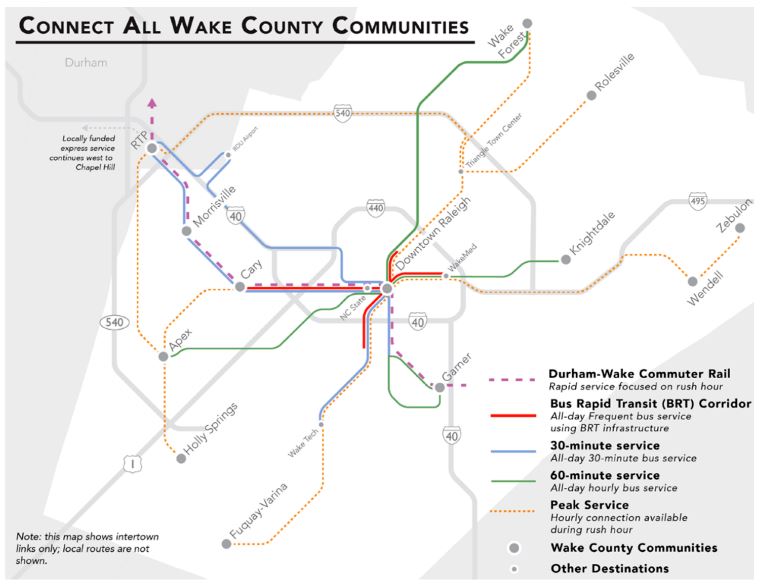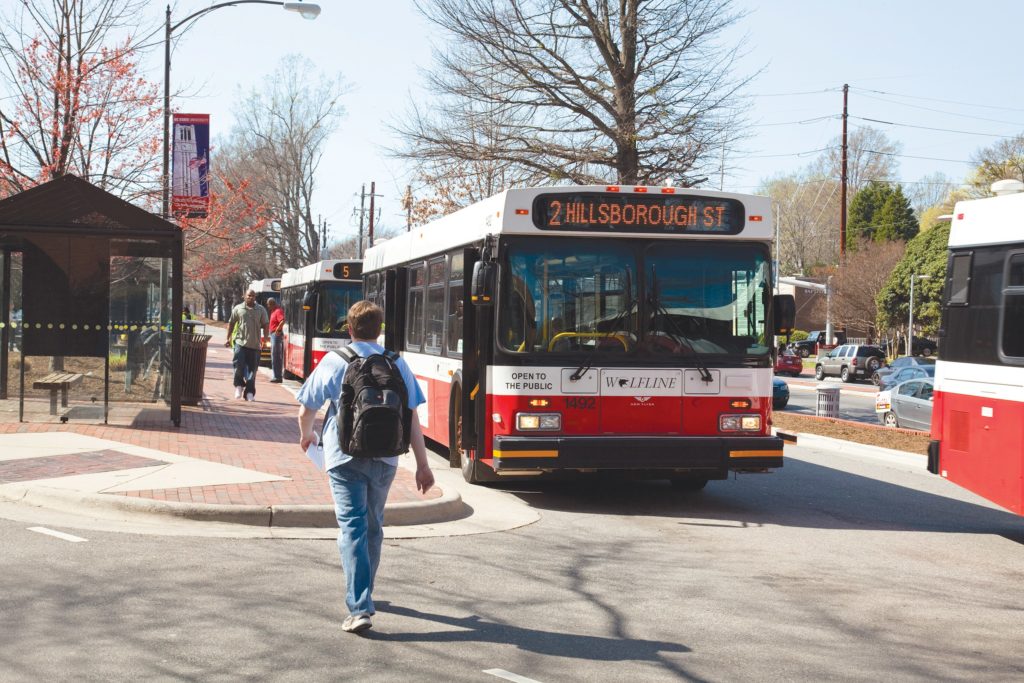Wake County has a massive population, growing by an estimated 64 people per day. Many of us are used to the long commutes, heavy traffic, and frustration associated with said growing population. However, in November, Wake County voters were heard and the Wake County Transit Plan was approved! The Wake County Transit Plan isn’t news to any Triangle residents.
If you’re unfamiliar with the plan, here’s a quick summary of the Wake County Transit Plan.

- Build a frequent “Bus Rapid Transit” network in high-traffic areas that will incorporate dedicated bus lanes, level boarding platforms, and other enhanced features that will improve the speed and quality of service.
- Create a brand-new commuter rail line that will utilize preexisting tracks to provide a backbone of passenger train service across the county, thereby enabling people to completely avoid daily road traffic congestion.
- Expand the frequent network (which is every 15 minutes) from 17 miles to 83 miles. All service will be be expanded to 19 hours a day.
- Provide triple the current bus service in just the first few years, connecting each town in the county.
According to Wake Transit, the implementation of this plan could take more than one million miles of travel off our roads every single day. How? By offering people attractive alternatives to driving. More than 50 percent of homes and 70 percent of jobs will be within half a mile of a transit stop across Wake County. Talk about efficiency!
GoTransit discusses its key role in transforming Triangle transit. Check out what’s in store.
In November 2016, Wake County voters agreed to raise the county’s sales tax rate by a half-percent in order to fund the $2.3 billion Wake County Transit Plan. What will that mean locally? The local sales tax rate will increase from 6.75 percent to 7.25 percent beginning in April 2017. Then, in December 2016, the Wake County Board of Commissioners officially authorized two key sources of financial support for the Wake County Transit Plan. They are: a $3.00 increase in the Regional Transit Authority Registration Tax as well as a new $7.00 Wake County Vehicle Registration Tax. These two local funding sources are in addition to the half percent increase of local sales and use tax referendum.
Wake County Transit Plan Update
It’s been months since December, so what’s going on with the Wake County Transit Plan?
In February, the GoTriangle Board of Trustees approved the $3.00 increase to the Annual Motor Vehicle Tax in Wake County. This is one of the key funds for the Wake County Transit Plan, and is especially important for the bus services. Annual Motor Vehicle Tax will help pay for tripling of bus service, four Bus Rapid Transit Corridors and Commuter Rail service connecting Garner, Raleigh, Cary, RTP and Durham.
April 1st saw the tax go into effect within Wake County. The investment into better public transportation began, which is to say the tax voted on in November came into effect.
“Wake County has more than a million residents. That number is growing by an estimated 450 people every week,” says Wake County Board of Commissioners Chairman Sig Hutchinson. “Projects funded through the Wake County Transit Plan will make commuting options more frequent, reliable and easier to use. We are thrilled to see this investment begin to take shape. We look forward to the enhancements it promises for the community.”
So, what’s coming up next? How will these developments begin to take in the Triangle and Wake County?
Change is on the Horizon
This summer, the other key funding sources will come into effect. This means the $7.00 Wake County vehicle registration tax will begin, as well as an $8.00 regional registration tax. The regional registration tax increases by $3.00 from the original $5.00 in August, 2017.
Tax isn’t the only thing on the horizon for the 2017-2018 fiscal year. Other selected project proposals include:
- Expanding Monday through Friday service frequency to every 15 minutes for the GoRaleigh 7 route. Also, expanding Sunday service on all existing routes.
- Expanding mid-day service frequency for GoCary routes 3, 4, 5 and 6 and adding Sunday service on all existing routes.
- Increasing frequency to every 30 minutes on GoTriangle route 100 between Raleigh, Raleigh-Durham International Airport and Research Triangle Park.
- Increasing frequency, days of operation and hours of service on GoTriangle route 300 between Cary and Raleigh.
- Significantly increasing door-to-door service for rural residents through
- Continuing express bus routes to Fuquay-Varina, Knightdale, Wendell and Zebulon.
What Residents Are Saying
Some of the change brought on by the Wake County Transit Plan is already affecting surrounding Wake County communities like Fuquay Varina.
“For residents who do not have direct access to personal transportation, this service has filled their transportation void by providing a low-cost, efficient transportation service,” says Town of Fuquay-Varina’s Economic Development Director, Jim Seymour. “For those residents who do have access to a personal transportation and want to reduce their transportation out-of-pocket costs, this service has reduced typical transportation costs—travel time, operating costs and parking facility costs. For some households, it offers the opportunity to lower the cost of vehicle ownership by transitioning from a two-vehicle to one-vehicle household.”
If you’re looking to learn more about the Wake County Transit Plan and associated projects, there are many resources to check out.
Real Estate Experts
 For more information about the Wake County Transit Plan, you can visit their website or Facebook page. For more information about living, working, and commuting in Wake County, contact Real Estate Experts at 919-813-6449. With our local expertise, we can help you make the best decision for you or your family as you become residents of Wake County or the Triangle area.
For more information about the Wake County Transit Plan, you can visit their website or Facebook page. For more information about living, working, and commuting in Wake County, contact Real Estate Experts at 919-813-6449. With our local expertise, we can help you make the best decision for you or your family as you become residents of Wake County or the Triangle area.
If you are interested in learning about the neighborhoods surrounding downtown Raleigh and other properties in the greater Triangle area, visit us online. Call us today at 919-813-6449 or e-mail us at
[email protected] for additional information. We can’t wait to welcome you to your new home.

